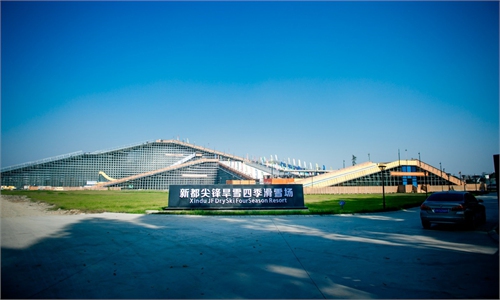SPORT / OLYMPICS
GT exclusive: How was 'missile booster' applied in Winter Olympics training sessions?
At the Beijing 2022 Winter Olympics, the Chinese cross-country ski team made a breakthrough in the event, which used to be dominated by European athletes. Team China athletes not only achieved the goal of participating in all sports events, but also set a historical record for China's cross-country skiing. All this was accomplished in just a few years.
Behind this rapid progress, in addition to favorable policies and hard training by the athletes themselves, the application of high technologies also played an important role. Among them, training equipment adapted from a missile booster has attracted public attention due to its unique design concept and application scenarios. Recently, Global Times reporters visited the China Academy of Aerospace Aerodynamics (CAAA) to reveal the "magic" behind the technology.
To make outstanding sports talents better and faster adapt to the characteristics of cross-country skiing, some space technology that is not related to sports has been applied to the daily training of China's cross-country ski and speed skating teams. The Global Times learned from research fellows at the CAAA that the equipment, adapted by Beihang University, using small missiles and drone engine technology, has been successfully applied in daily training for cross-country skiing and speed skating and helped athletes achieve breakthrough results at the Beijing 2022 Winter Olympics.
Zheng Liu, the engineer who participated in the development of the technology told the Global Times that the ducted fan jet powered booster, which is based on the aerodynamic principle, can provide auxiliary thrusts for cross-country skiers and speed skaters according to their training needs. This means that athletes can break through their own physical limitations in training, and carry out all kinds of extreme training activities as a result.
Zheng introduced that the function of this equipment is mainly reflected in two aspects: one is to help athletes reach a certain speed before the bend, to practice their technique, saving athletes the consumption of physical strength for the straight stage at the start and improve their training efficiency; the second is to break their speed limits. "In a typical speed skating training, athletes can increase their speed by 10 percent after a lap of 400 meters." Zheng said.
The booster, which weighs about 3.5 kilograms, can be attached to an athlete's back by simply wearing the component and is propelled by the power unit to assist training. The thrust control device of the booster has a manual control function, which can control the thrust size and start and stop of the booster artificially in real time.
According to Zheng, the device can use missile boosting technology for athletes to create a state of high-speed movement, such as helping athletes practice bend techniques, change lanes at high speeds and jump. It enables athletes to break through their physical limit and form muscle memory at a high speed, creating a new training method under the extreme state.
Cross-country skiing has always been a popular event at the Winter Olympics. There are 12 cross-country skiing events at the Beijing 2022 Winter Olympics, with three events in Nordic combined and 11 in biathlon. There are 26 events related to cross-country skiing, nearly a quarter of the 109 events on offer.
However, China's participation in cross-country skiing has been relatively low. At the 2018 PyeongChang Winter Olympics, China had only four athletes in cross-country skiing and the number of registered cross-country skiers in the country was less than 400.
To achieve the goal of not only making the Games run smoothly but also achieving the best possible results at the event, China's cross-country skiing training team has selected outstanding talents from sports such as long-distance running, cycling, rowing and other events to participate in cross-country skiing events since 2017.
Thanks to the application of the high-tech equipment in daily training, the Chinese cross-country ski team achieved several breakthroughs at the Beijing 2022 Winter Olympic Games. It not only created a record high number of participants, but also achieved the best possible athletic results at the event. In the men's individual short distance event, China's Wang Qiang also won second place of group 4 in the quarter final, creating history for Chinese cross-country skiing.
China's speed skating team is targeting for medals in several finals over the next few days, according to the event schedule.
As a believer of supporting the Games with high technology, Zheng said that he felt very proud when he saw that the training equipment he helped develop had significantly helped Chinese athletes achieve excellent results at the Beijing 2022 Winter Olympics. "I'm honored that Chinese athletes use our aerospace science and technology to perform better," Zheng said. "At the same time, the athletes' Olympic spirit also inspired me, I believe that in my later work I will also be able to uphold the astronaut spirit and the Olympic spirit together."

